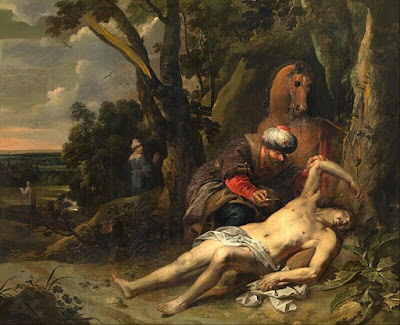www.CornerstonePublications.org
According to Colossians 4:14, Luke was a physician. The Parable of
the Good Samaritan provided in the Gospel of Luke appears to have been
recounted by a physician. Luke preserves information about the condition and
treatment of the victim. He is careful to relate that the man was stripped of
his clothing, beaten, left half dead and alone. Luke then notes that the
victim’s wounds were bandaged and treated with oil and wine. He also mentions
that the victim was transported on a beast of burden, taken to an inn, and the
innkeeper was paid upfront to take care of the man’s needs. A physician would
have been interested in describing those details.
Hopefully we will all meet the Good Doctor on the last day,
10:25 Alx[saying],
Byz[and saying (DRA, MRD, NAB)].
10:27 Alx/Byz[the Lord your God], Minor[the Lord God]; ~Deuteronomy 6:5, Leviticus 19:18.
10:30 Alx[Jesus
said], Byz[But Jesus said (DRA, KJV, NKJ)].
10:32 Alx/Byz[when he came Greek when
he became to be coming], Minor[when he was at (DRA) others when he came].
10:33
Alx[and seeing, he had compassion],
Byz[and seeing him, he had compassion (ASV, DRA, ESV, HCS, JNT, KJV, MRD, NAS,
NAU, NET, NIV, NJB, NKJ, NLT, NRS, REB, RSV, TEV, TLB)].
10:35 Alx[The
next day], Byz[adds when he
departed (KJV, NKJ)]; Alx[and said],
Byz[adds to him (KJV, NKJ, NLT, TEV,
TLB)].
10:36 Alx[Which
of these], Byz[Now which of these (KJV, MRD, NKJ, NLT, TLB)].
10:37
Alx[And Jesus said], Byz[Then Jesus
said (HCS, KJV, NAU, NET, NKJ, NLT, TLB)].
10:25 Tertullian[On the Flesh of Christ 7; Five Books Against Marcion Book IV.19]
10:25-28 Tertullian[An Answer to the Jews 2]
10:27 Leviticus 19:18; Deuteronomy 6:5,
10:12; Joshua 22:5; Matthew 5:43n; Pseudepigrapha[Sibylline Oracles 8.481;
Testament of Issachar 5:2]; Apostolic[Didache 1:2]; Clement of
Alexandria[Stromata Book II.15, IV.3]; Tertullian[On the Apparel of Women Book
II.2; Five Books Against Marcion Book IV.25, V.8]
10:28 Leviticus 18:5; Nehemiah 9:29; Ezekiel
20:21; Matthew 22:35-40; Mark 12:28-34
10:29 Leviticus 19:16, 33;
Pseudepigrapha[Letter of Aristeas 1.228]; Clement of Alexandria[Who is the Rich
Man that shall be Saved 28]
10:30 Pseudepigrapha[Joseph and Aseneth 27:3]
10:30-35 Pseudepigrapha[Joseph and Aseneth
29:5]
10:30-37 Philo[Special Laws III (116) cf. {Exodus
22:22}]; Nag Hammadi[Gospel of Philip 78]
10:34 2Chronicles 28:15; Methodius[Oration on
the Psalms 6]
10:35 Irenaeus[Against Heresies Book
III.17.3]
10:36 Pseudepigrapha[Martyrdom and Ascension
of Isaiah 8.15]
10:36-37 Clement of Alexandria[Who is the
Rich Man that shall be Saved 28]
10:37 Pseudepigrapha[Joseph and Aseneth 23:3]








